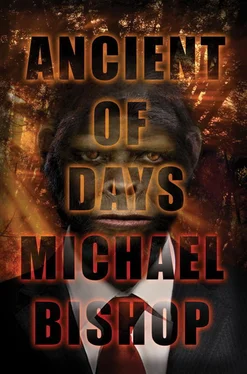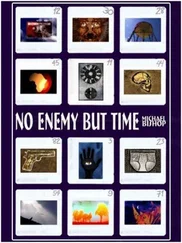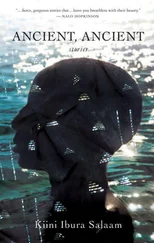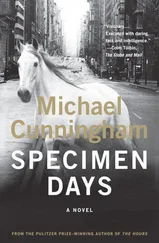“My name,” she said, “is Caroline Hanna.”
I tried to get a grip on the familiarity of her name.
“You’ve heard of me before. Once, at Brian Nollinger’s urging, you took some photographs of Adam. Brian showed these to me. And it was from me that he got the clue to research the island of Montaraz as Adam’s possible point of origin.”
“Nollinger,” I said numbly.
“You don’t like him, do you?”
“In my book, he’s a world-class jerk.”
“That’s not entirely fair,” Caroline Hanna said evenly.
“I’m sure it isn’t. But his kindness to you, or to his aged mother, doesn’t absolve him of the dirt he kicked on my ex-wife. It doesn’t clear him of abusing my hospitality in Beulah Fork. To three quarters of his acquaintances, the man may be nobility incarnate—but if he shows me only his pimply backside, Miss Hanna, that’s what I’m going to judge him by.” She regarded me as if I were a sick bear in Atlanta’s zoo. “I called you Miss Hanna, didn’t I? You’re probably Doctor Hanna.”
“Call me Caroline.”
“Paul.” I tapped my thumb against my chest. “Anyway, I’m sorry to say your pal Nollinger, back in February, even had the brass to ask RuthClaire and Adam for money. He needed funds for field work he wanted to do somewhere.”
“He’d come to apologize.”
“Well, he blew that. He started talking about some painterly ape in England.”
Caroline Hanna smiled wistfully. “That’s Brian, all right.”
“What can I do for you? Would you like a beer?”
She declined, saying she’d only wanted a closer look at T. P.—the sweetie—and to introduce herself to the man who’d tied Brian into the biggest event in evolutionary science since the publication of Darwin’s Origin of the Species . She was glad to have contributed in a small way to the unraveling of the mystery of the origins of the Montaraz habilines. And she felt an odd kinship with me, each with our peripheral importance to the affair. Of course (she hastened to add), she was further on the periphery than I, but she sympathized with the muddle of feelings that a person in my position must sometimes experience. Wasn’t she running a gauntlet of small but painful changes herself?
Ever the diplomat, I said, “Like what?”
She said, “I wasn’t fishing for a chance to list them, honest.”
“You don’t have to list anything. Just tell me the most painful of your changes. It might do you good.”
Caroline considered this. Then she said, “Brian left Emory in June. He resigned his post in the anthropology department and left—without telling me anything. No foul play. He told the folks in his department. He just didn’t divulge his plans to me.”
“Another teaching or research position somewhere?”
“Not according to his department head. Brian said he was going to take off for a year and go overseas.”
“Maybe to visit Alistair Patrick Blair in Zarakal.” Caroline smiled wanly. I added, “Self-possessed women frighten him. The lack of a goodbye is the damning proof. He’s what my mother would have called a cad.”
“She would’ve had every right, but I’m not your mother.”
I lifted my beer mug to Caroline. “Amen to that.” I set the mug down. “But what else? Surely, getting shut of the biggest No-Dōz pusher at that primate field station can’t top the list of your woes.”
“You know you’re out of line, don’t you?”
“Sorry. I can’t help my feelings about, uh, Brian . Tell me something that’ll stir my sympathy for him.”
She started to rise. “Forgive me. I’ve got work to do.”
I caught her wrist. “One more chance. One more item from your list of worries. And I won’t be such a sarcastic bastard again, believe me.”
“No, you won’t,” Caroline said, subsiding. “How about this? The situation among the Cuban detainees in the Atlanta Penitentiary has me down. Some of those people belong in prison. Others deserve their freedom, and all my efforts to bring about releases have gone for naught. There. Do you like that one?”
“I’m in sympathy with it.”
“Stupid idealist.” She smiled gently. “I’m going.”
“Don’t you want to know what I’m doing here… with T. P.?”
“T. P.’s the baby? No. No, I don’t. It’s none of my business, and my business isn’t really any of yours, either.” Again she made as if to stand.
“Give me your address so we can redefine the limits of each other’s business.”
Hastily, she scribbled on the edge of a napkin. “Here’s a telephone number. Now I’ve got to go, really.”
T. P. reacted to her move—throughout our talk, he’d stared at her with moony adoration—by reaching out and upsetting his drink. I gathered napkins with which to blot the mess. In order to get at it, I lifted T. P.’s chair out of the way.
“Do you need some help?” Caroline asked.
“No, I’ve got it. Look, though. The little bugger’s stuck on you, lady. So am I.”
“Hush. That’s embarrassing.” She spoke in an undertone and looked around Everybody’s at everybody looking at us.
“Knocking over his cup? Nah. Happens all the time with kids. Not embarrassing. People make allowances.”
“I’m not talking about that, and you know it.” She retreated a step or two. “I won’t mind if you call, though—not at all.” Before I could reply, she’d gone.
A young man with bushy hair and a long apron helped me finish cleaning up, and I sat back down. During her fifteen- or twenty-minute stint at our table, Caroline Hanna had affected me in the powerful, nonrational way teenagers sometimes collide with each other. A pulse in my throat was working, and a film of sweat on my palms endangered my grip on my beer mug. How ungrown-up. How immature. In a few years I would be fifty, and here I was actively encouraging the kind of hormonal rush that sends callow high-school aspirants to ecstasy screaming to the showers. Nobody since RuthClaire had made me feel that way, not even Molly Kingsbury.
Later, our bill duly paid, T. P. and I returned to the hospital.
Back in Adam’s recovery room, RuthClaire told me that David Blau had invited us to go with him and his wife Evelyn to a nightclub near the Georgia Tech campus. The club—Sinusoid Disturbances—was on a narrow alley perpendicular to Spring Street. Its main attraction was live music, but it also featured (although only on Fire Sine Fridays) the work of avant-garde “performance artists.” These artists used music, projected visual images, props, the spoken word, and a lot of strange choreographies to make statements about art and life. David ranked high among the performance artists who had given Sinusoid Disturbances its reputation as Atlanta’s leader on the New Wave nightclub scene. His group, consisting entirely of people from Abraxas, would headline at tonight’s Fire Sine Friday. And so Blau wanted RuthClaire and me to attend.
“What about Adam?” I asked.
The habiline typed: I BE FINE. TOMORROW, I AM UNWRAPPED. ME FOR REST AND READING.
“May I bring a date?”
This request startled RuthClaire. “A date?”
“That’s right. A woman.”
“I never assumed you meant a two-legged raisin. I just didn’t know you knew anybody up here to ask.”
“I’ve been shinnying down a knotted sheet every night at your house, Ruthie Cee. Meet a lot of folks that way.”
“It’s amazing Bilker hasn’t shot you. What’s her name?”
“Caroline Hanna.”
As I had done, RuthClaire struggled to locate this name in her mental ledger of friends and acquaintances. I let her struggle. In fact, I left Adam’s room in search of a telephone, found the number of the sociology department, dialed it, and asked to be put through to Dr. Hanna’s office. Although startled to hear from me so soon, she accepted my invitation, offering to meet me at the Montaraz house at seven-thirty, if that would simplify our rendezvous. Right now, though, no time for chitchat—she’d promised the students in her next class she’d have a test graded for them today.
Читать дальше












